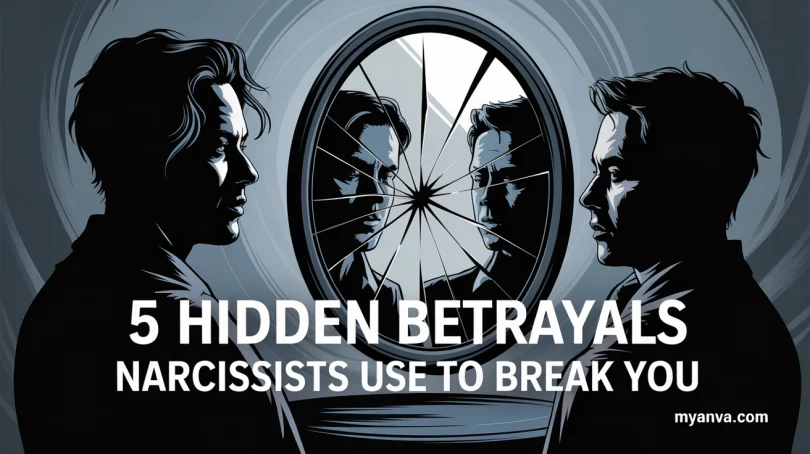Like so many of you, I’ve faced betrayal in many forms. But the hardest to overcome wasn’t a lie or an affair, it was the slow realization that the person I trusted wanted me to doubt myself. That version of me, confused, small, and walking on eggshells, was easier to control. This kind of betrayal doesn’t happen overnight. It’s built on dozens of smaller, subtle betrayals that don’t look like abuse on the surface but leave the deepest scars.
1. They Mirror You to Disarm You
Picture this: you’re in a café, sharing your life story with someone you’ve known for just an hour, but they feel safe. They nod at the right moments, share eerily similar experiences, and seem to get you. It feels like a soul connection, but you’re being profiled.
Mirroring is a tactic used by trained operatives in the FBI and CIA to build trust and influence. Narcissists use it too, not to bond, but to control. They study your fears, dreams, and desires, reflecting them so convincingly that you believe it’s love.
But it’s a setup. When the love bombing fades and manipulation begins, it’s emotional whiplash. You thought they knew your soul, but they only studied it to take it apart.
Mirroring isn’t inherently bad; we all do it when we connect naturally. Our brains are wired to seek familiarity, signaling safety. But narcissists exploit this biology, creating an illusion of connection to lower your defenses. It’s not weakness; it’s human nature being used against you.
Related Topics:
Do This to Psychologically Make Someone Like You
Forgiveness won’t save a Relationship
5 Dark Mind Games Narcissists Use to Break You
2. They Weaponize Your Empathy
In Gone Girl, Amy convinces you she’s the victim until the twist reveals she’s been orchestrating everything. Narcissists do this too. They don’t demand sympathy; they seduce it. By dropping hints of their trauma, they pull you into a codependent empathy loop. You justify their harmful behavior because you feel for them, especially if you’ve experienced trauma yourself.
Your empathy becomes a trap. You feel responsible for their pain and guilty for protecting yourself. They share just enough to keep you hooked, using their wounds to create obligation, not connection. When you need empathy, they flip the script, making you feel at fault. Leaving feels like abandoning them, but staying means abandoning yourself.
3. They Use Your Loyalty Against You
In behavioral economics, the sunk cost fallacy explains why we stick with failing investments, time, money, or energy, making it hard to walk away. Narcissists weaponize this by tying your loyalty to a promised future that never arrives. This future-faking talk of dream vacations, moving in together, or a better tomorrow keeps you invested in potential, not reality.
They remind you of “everything we’ve been through” to guilt you into staying. You’re not just staying for the future; the past feels like proof you should keep going. This conditioning makes you explain away their harm in the name of love or hope. If you blame yourself for not leaving sooner, know this: you weren’t naive, you were conditioned.
4. They Redefine Words to Confuse You
In George Orwell’s 1984, the government controls thought by changing the meaning of words, war is peace, and freedom is slavery. Narcissists do this on a personal scale, subtly shifting emotional definitions until you doubt your reality. Love becomes sacrifice, respect means obedience, boundaries are rejection, and loyalty demands silence.
At first, these shifts are small: “If you loved me, you wouldn’t need space.” Over time, you question what’s normal. Setting boundaries feels selfish; defending yourself feels unnecessary. This linguistic erosion isolates you, leaving you emotionally exhausted. By controlling the language, they control the rules, making you feel perpetually wrong.
5. They Break the Mirror You Use to See Yourself
We partly understand ourselves through feedback in close relationships, how someone looks at us, responds, or mirrors us emotionally. Honest feedback builds a healthy sense of self; distorted feedback chips away at it. Narcissists twist this mirror, reflecting you through their projections and shifting expectations. One day you’re amazing; the next, you’re too much. Speak up, and you’re dramatic. Shut down, and you’re cold.
Over time, you stop trusting your reactions and start reading them instead. This betrayal leaves you questioning not just what happened, but what’s wrong with me. The shame comes from trying to find yourself in a mirror that was never clear. The problem was never you, it was their distorted reflection.
Healing Starts with Naming the Truth
These five betrayals are powerful because they’re hard to name and harder to prove. They don’t look like harm on the surface, but they rewire your brain, rewrite your story, and convince you the problem is you. Healing begins by calling it what it was: not love, not growth, but a dysfunctional relationship.






